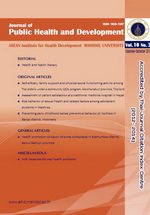Factors influencing weight control among female high school students in the Bangkok metropolitan area
Main Article Content
Abstract
The purpose of this cross-sectional study was to describe weight control among female high school
students in Bangkok and to determine predictors of weight control. Data were collected from 161 female
high school students who were selected by multi-stage sampling. Data were analyzed using Pearson’s
correlation analysis and stepwise multiple regression analysis
The findings revealed that female high school students in Bangkok reported moderate levels of weight
control behavior. Factors related to weight control among female high school students in Bangkok were
perceived health status, level of depression, parental bonding, knowledge about weight control, attitudes
toward weight control, perceived self-efficacy in controlling weight, perceived enabling factors in assessing
accessibility and availability of health services. Three predictive factors towards weight control were: (1)
perceived self-efficacy in controlling weight; (2) family relations, particularly father’s care and protection;
and (3) perceived accessibility and availability of health services; these factors taken together explain 18%
of weight control behavior among female high school students in Bangkok.
The findings suggest that health promotion activities regarding perceived self-efficacy on weight control
should be undertaken with female high school students. Family relations, particularly the father’s care and
protection, should be strengthened. In addition, school and community policies should encourage the development of more facilities to promote appropriate weight control, such as exercise programs, health food
stores, and health promotion activities. In addition, schools should have a screening program for those with
family problems or those with depression to evaluate the levels of weight control among such students.
students in Bangkok and to determine predictors of weight control. Data were collected from 161 female
high school students who were selected by multi-stage sampling. Data were analyzed using Pearson’s
correlation analysis and stepwise multiple regression analysis
The findings revealed that female high school students in Bangkok reported moderate levels of weight
control behavior. Factors related to weight control among female high school students in Bangkok were
perceived health status, level of depression, parental bonding, knowledge about weight control, attitudes
toward weight control, perceived self-efficacy in controlling weight, perceived enabling factors in assessing
accessibility and availability of health services. Three predictive factors towards weight control were: (1)
perceived self-efficacy in controlling weight; (2) family relations, particularly father’s care and protection;
and (3) perceived accessibility and availability of health services; these factors taken together explain 18%
of weight control behavior among female high school students in Bangkok.
The findings suggest that health promotion activities regarding perceived self-efficacy on weight control
should be undertaken with female high school students. Family relations, particularly the father’s care and
protection, should be strengthened. In addition, school and community policies should encourage the development of more facilities to promote appropriate weight control, such as exercise programs, health food
stores, and health promotion activities. In addition, schools should have a screening program for those with
family problems or those with depression to evaluate the levels of weight control among such students.
Article Details
How to Cite
1.
Somjarit M, Amnatsatsue K, Kerdmongkol P, Powwattana A, Klunklin S. Factors influencing weight control among female high school students in the Bangkok metropolitan area. J Public Hlth Dev [internet]. 2013 Aug. 14 [cited 2026 Feb. 28];11(2):3-17. available from: https://he01.tci-thaijo.org/index.php/AIHD-MU/article/view/10945
Section
Original Articles


